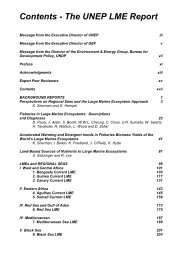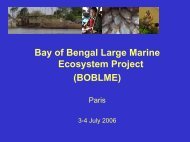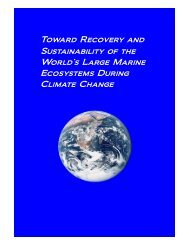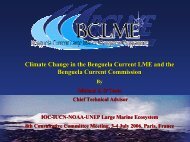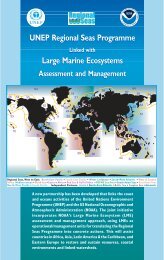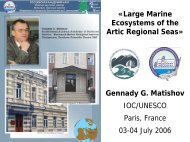Sustaining the World's Large Marine Ecosystems
Sustaining the World's Large Marine Ecosystems
Sustaining the World's Large Marine Ecosystems
You also want an ePaper? Increase the reach of your titles
YUMPU automatically turns print PDFs into web optimized ePapers that Google loves.
Figure 6. Serious eutrophication, harmful algal blooms and dead zones in coastal areas.<br />
Changing Courses<br />
Generally speaking, changes in <strong>the</strong> quantity and quality of marine ecosystem<br />
resources are attributed principally to human predation, as demonstrated by<br />
many studies (e.g., Tang 1989, 1993; Zhang and Kim 1999). However, an<br />
analysis of inter-decadal variations of ecosystem production in <strong>the</strong> Bohai Sea<br />
indicates that it is difficult to use traditional <strong>the</strong>ory (e.g. top-down control, bottomup,<br />
or wasp-waist control) to explain directly and clearly <strong>the</strong> long-term variations<br />
of production levels in <strong>the</strong> coastal ecosystem (Tang et al. 2003). We observe that<br />
under <strong>the</strong> same fishing pressure, <strong>the</strong> biomass yields of some exploited stocks in<br />
<strong>the</strong> Yellow Sea appear to be fairly stable (e.g. Spanish mackerel), or recovered<br />
(e.g. small yellow croaker). Changes in biomass yields and species shifts in<br />
dominance cannot be explained merely by fishing pressure. Climate change may<br />
have important effects on <strong>the</strong> recruitment of pelagic species and shellfish in <strong>the</strong><br />
Yellow Sea LME. A new study identifies four SST regimes in <strong>the</strong> Yellow Sea LME<br />
over <strong>the</strong> past 138 years: a warm regime (W) before 1900, a cold regime (C) from<br />
1901 to 1944, a warm regime with a cooling trend (WC) from 1945 to 1976, and a<br />
warm regime with a warming trend (WW) from 1977 to 2007 (Figure 7). SST<br />
83



